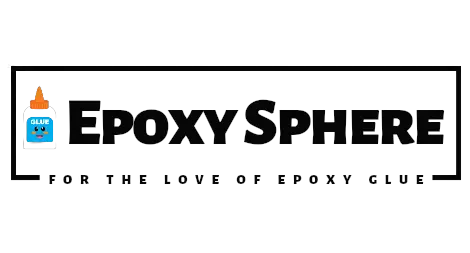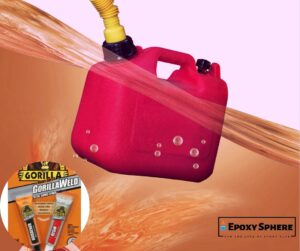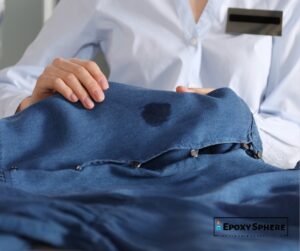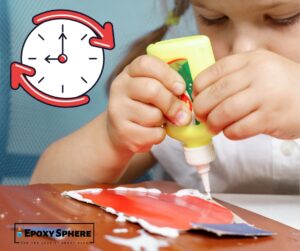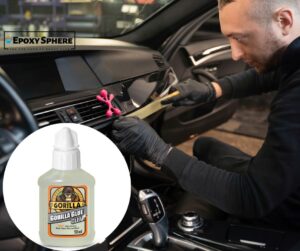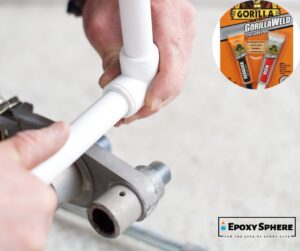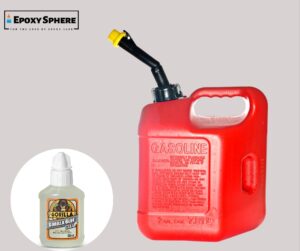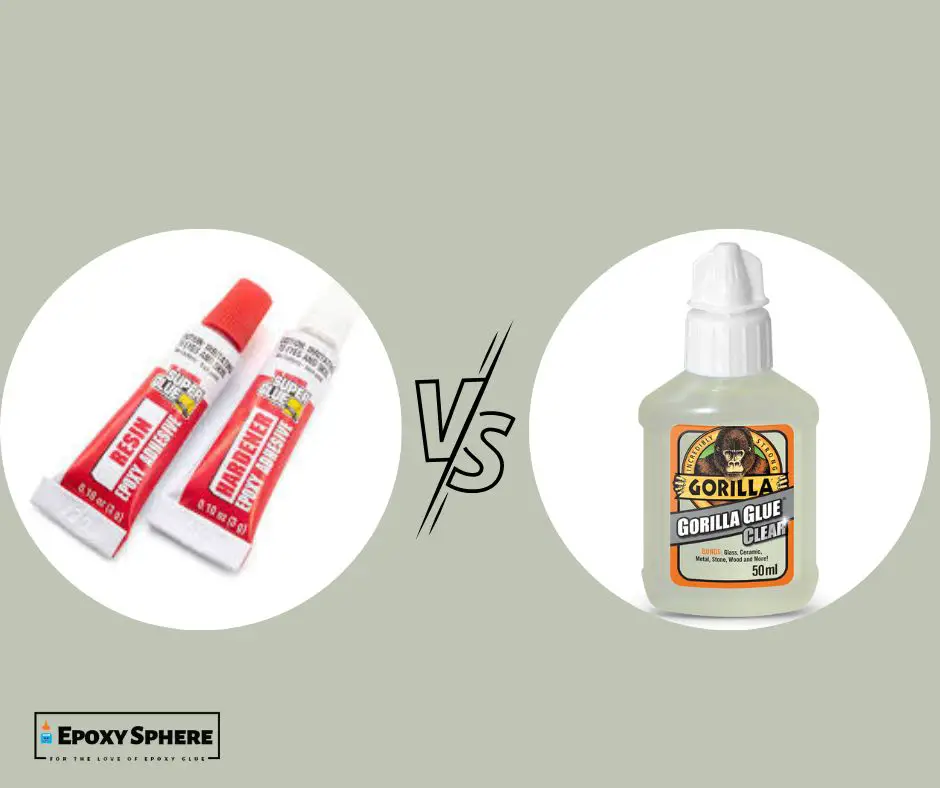
When it comes to joining parts together, using glue is one of the most popular options available today. Whether building a deck or fixing your child’s toy, you want to know which glue to use. Should you go with epoxy or gorilla glue? Or, more importantly, is gorilla glue stronger than epoxy?
No, gorilla glue isn’t as strong as epoxy. Although both adhesives are very good at smooth bonding surfaces, they show different weaknesses on these surfaces.
In this article, I will compare the two types of glue in terms of strength, durability, price, and longevity.
Gorilla Glue and Epoxy Explain
The first thing you should know about Gorilla Glue is its polyurethane adhesive. The glue is made from a series of complex polymer compounds.
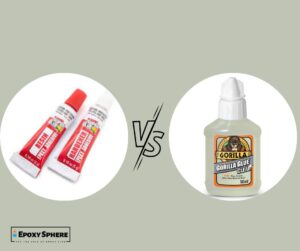
On the other hand, Epoxy is made by reacting two different compounds together: resin and hardener (or catalyst).
Epoxies are also two-part adhesives because they need two components before you can use them in your project.
The ratio of epoxy resin to hardener depends on what you are using it for. The more hardener you add, the quicker your adhesive will cure and the less durable it will be.
What Makes One Glue Better Than Another?
There are a few factors that make one glue better than another. These include the following:
Tensile strength
Tensile strength is the amount of force that a material can withstand without breaking. Tensile strength is measured in pounds per square inch (psi) or kilo Pascal (kPa). When it comes to epoxy and gorilla glue, Epoxy has higher tensile strength than gorilla glue.
Gorilla Glue is incredibly strong and durable. Its tensile strength is measured at 45 pounds per square inch (psi), and it doesn’t foam as much as other glues.
However, epoxy is stronger, with its tensile strength measuring at around 4500 psi. This makes it 100 times more potent than Gorilla Glue.
The strong and aggressive bonding provides a permanent bond to any material. This is why epoxy mixtures are not flexible, and any movement of one material will break its bond with another material completely.
Shear strength
Shear strength measures how well a glue can resist the force of pulling apart two surfaces. In this regard, Epoxy comes out tops again.
Due to its greater viscosity or thickness, Epoxy has higher shear strength than gorilla glue. The Epoxy has a higher shear strength as well: 31000 psi. In other words, the Epoxy can resist being cut or torn easier than gorilla glue.
Heat resistant
One important thing to note in comparing Epoxy and gorilla glue is the differences in their heat resistance. Gorilla Glue can tolerate heat up to 220 degrees Fahrenheit, while Epoxy can withstand temperatures up to 300 degrees F.
While this disparity is not much, it does matter what you use your glue for. If the object of your project will be around constant heat, then it’s best to go Epoxy over gorilla glue.
Gap filling
The gap-filling ability of Epoxy is better than gorilla glue. This is because Epoxy has a lower viscosity, so it can be easily spread into more meaningful gaps and even penetrate deeper into small cracks. If you have large cracks or broken parts, you may need something more substantial, like an epoxy mixture.
Gorilla glue can fill small gaps or broken parts as well. Using gorilla glue, you can easily stick up the plastic or metal alloys where there are small cracks, but this would require more work for larger cracks.
Price
The price of Epoxy is generally more than the price of gorilla glue, but the costs depend on the size of your project. For example, a small bottle of Gorilla Glue costs around $10, and a gallon costs about $70.
In contrast, an eight-ounce bottle of Loctite Marine Epoxy will run you $18 or so, and a quart typically runs around $25. So if you are doing smaller projects where only one or two ounces are required at most, it may be cheaper to use gorilla glue instead.
Dry time
Technically, both adhesives will tell you they dry quickly, which is true. However, the curing time is significantly different. For instance, gorilla glue takes around 10 to 40 seconds to dry, but it can take up to 24 hours to settle in completely.
On the other hand, Epoxy would take up to 72 hours to completely fill in. In summary, gorilla glue takes less time to bond than epoxy glue.
Longevity
In this regard, there are no actual measurements but estimates. Several factors affect the longevity of both types of glue. This includes the level of expertise, the surface it’s used on, and the kind of material it’s used on.
All of these factors make it hard to measure how long epoxy or gorilla glue lasts. Some would say epoxy glue can last up to 3 to 5 years; others even suggested it could last for up to 10 years. For gorilla glue, the estimated time of longevity is around one or two years.
Surface texture
Also, the texture of your surface often determines which adhesive is stronger. If you’re working with a rough or uneven surface, Epoxy is better than gorilla glue because it adheres well to those areas.
On the other hand, if you’re working with smooth and flat surfaces, then there’s no need for such a thick layer of bonder; in this case, gorilla glue will be more effective.
Which Adhesive Should I Use: Epoxy Or Gorilla Glue?
Epoxy is more potent than gorilla glue, but it’s also more expensive and takes longer to dry. While this may not be a problem for many home projects, professionals who work on large structures will want to go with Epoxy instead.
It’s also important to note that Epoxy is more versatile in terms of surfaces. It can adhere well to more materials than gorilla glue, making it a better choice for industrial or commercial applications.
Gorilla glue is less expensive than Epoxy and dries much faster, which makes it ideal for quick fixes.
However, its strength isn’t quite as good as epoxies: while both adhesives are rated at 4500 PSI (pounds per square inch), gorilla glues have been tested up to 2000 PSI before breaking down completely.
Conclusion
As a general rule of thumb, epoxy is more potent than Gorilla Glue. However, there are some drawbacks before deciding which glue to use in your project. One meaningful drawback is that Gorilla Glue can cause foaming action during curing time.
Epoxy resin will not expand as much during the bonding process as Gorilla Glue. Epoxy is more robust but brittle, while gorilla glue is more flexible but weaker. Because of this, consider the surface you’re gluing when choosing an adhesive.

Hi, This is John Davis. After years of working in the construction industry, I decided to create a website that would provide people with information about glue and its exceptional uses. I hope You find it useful
